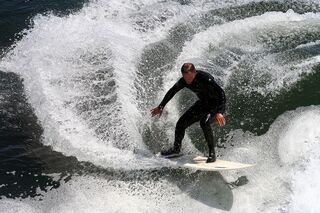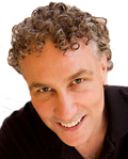Creativity
I Wonder What Will Happen if...
Necessity is the mother of invention, but Curiosity is its fun cousin.
Posted February 10, 2014
Tom’s board spun out from under his feet as he attempted to surf the large wave. As he plunged backward into the roiling surf, he was frustrated once again by the lack of stability from his traditional Hawaiian style surfboard.
A few days later as he was walking along the beach, he came across a wrecked and abandoned speedboat lying upside down. His eyes were drawn to the small metal keel on the bottom. He knew that keels were placed on boats to stabilize them during hard turns. He wondered what would happen if he put one on his surfboard. So, he pried the 12 by 4 inch keel off the boat, took it home and attached it to his board.

As he paddled out to the waves, he noticed that his board didn’t move around as much. Then when he caught his first wave he was amazed - not only by the increased stability, but also by an increased maneuverability. Before long, other surfers noticed his ability to stay up longer on the larger waves, and copied his idea. It was 1935, and Tom Blake’s fin revolutionized surfing.
In 1946, Dr. Percy Spencer was running some experiments with a magnetron radar system for Raytheon Corporation when he noticed that the microwaves had melted a candy bar in his pocket. Curious, he placed some popcorn kernels near the tube and cranked it up. The kernels exploded into perfect popcorn that went flying about the room. Next he placed an egg in front of the tube. Seconds later, it exploded too, but the egg was completely cooked.
He turned his new discovery over to company engineers, who over the next two years developed the world’s first microwave oven. They called it the Radarange.
Curiosity is key to creativity and innovation. For me, curiosity emerges when I’m cooking or writing. A favorite indulgence of mine is to spread peanut butter on toasted whole grain bread. One day while preparing this treat, I spotted a jar of sliced jalapenos, and thought, “Hmmm, I wonder what that would taste like?” So, I pressed several slices into the peanut butter on top of my toast. It was delicious, and now it’s the only way I’ll eat a peanut butter sandwich.
My curiosity is most active when I’m writing fiction. As I mentioned in a previous column, I usually begin with a “What if?” question. It’s here where I allow my unbridled curiosity to run free. One day I asked, “What if I could recreate a famous Biblical miracle using science?” and “What would I use it for?” then “How about fighting injustice?” And, thus my yet-to-be-published science-fiction novella No Heresy was born.
Children are naturally curious; which is why they ask so many questions. They want to explore the world around them and learn how everything works. Beating a wooden spoon on pots and pans to create new sounds; making mud pies, building snowmen, and catching fireflies - are all activities that nurture curiosity. Exploration and discovery are pleasurable pursuits that stimulate a child’s mind and encourages creativity.
Unfortunately that curiosity wanes over time. In part because children acquire knowledge and put it to practical use. But, more so because it is socialized out of them. In school they are taught to conform. Today, with rigid standards like “No Child Left Behind” and “Common Core,” curiosity is suppressed. Time is no longer allowed for exploration and discovery except in controlled situations. Following their own interests - just to see where it takes them - is not allowed.
I would like to see a looser structure in schools that empowers children to research things that fascinate them. Then encourage them to see how it connects with the core subjects of reading, writing, arithmetic, and history.
As adults we don’t have to leave our curiosity abandoned. It can always be reawakened. Let it run free: turn down a road you’ve never been on just to see where it goes; toss some unusual seasoning or some fruit into your next omelet; pick two items off of your desk and imagine how you might combine those into a new product. Go ahead, be curious - have fun! And, while you're at it, maybe you'll come up with the next great idea.
Robert Evans Wilson, Jr. is an author, humorist and innovation consultant. He works with companies that want to be more competitive and with people who want to think like innovators. Robert is also the author of the inspirational book: Wisdom in the Weirdest Places. For more information on Robert, please visit www.jumpstartyourmeeting.com.


